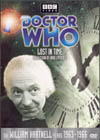Like "Galaxy Four" (story no. 18), this is a moral sci-fi story and manages to pack power into all of its dramatic, thematic, and action elements. The resolution is even smoother, and all quite logical, although we'll save further details of its distinctions in this area for the in-depth analysis version of this review to avoid spoilers. Ian Stuart Black is to be greatly commended for the resolution, and also for lacing the plot with good examples of moral thoughtfulness and courage all the way through (unlike "The Ark" [story no. 23] which saves all its morality for a rush-through at the very end). This script knows what its strengths are from beginning to end, and focuses on them accordingly.
We see a lot of good qualities in William Hartnell's Doctor in this story, things that the long term fan may tend to take for granted, but things that writers are sometimes neglectful to give to Hartnell's Doctor. His pride, curiosity, maturity, and courage shine here, to the point where he seems to have absorbed Barbara's good qualities and taken over the role she played in "Forest of Fear", (episode 3 of story no. 1: "An Unearthly Child"), only now much more charismatically. Steven gets to see a lot of action and take a commanding role in the story, and quite rightly too as it tends to bring the best out of him. Dodo also has a crucial role of discovery in this story, and it is probably the best use of her character yet on the series. I particularly like the foreknowledge at work between both the Doctor and the Elders of the city, for both their meeting and the flavour of the result, while the details of how it will work out remain a mystery until everything plays out. This is something I would expect from truly advanced people for my own reasons. The actual arrival of the TARDIS was unfortunately shifted into the previous story, which did it off screen on the cheap. At least the interior scene is imported into the beginning of this story. Christopher Barry seems to have directed the story well, at least in getting good acting performances from those involved. Frederick Jaegar, who later became a principal guest star in stories like "Planet of Evil" (story no. 81) and "The Invisible Enemy" (story no. 93), does well here as Jano. Ewen Solon, who also later appears in "Planet of Evil", plays Chal here, and his tricky calls across the scrubland stay well within good taste, and are actually hauntingly good. Sound effects for weapons fire also seem to be working better; significant short bursts of white noise signal initial firings, while a tingling whine continues from underneath for as long as the weapon remains on. What will really make or break this story, production-wise, is a satisfying visual effect for the guards' light-guns, which feature very heavily throughout. The credibility of any actor being caught in the guns' beams can be greatly influenced by the quality of the special effect that will interact with them. It's not too late to add some modern post-production, if recovered TV episodes are eventually discovered to need some badly! Barry's invention of the Daleks' negative beam effect, in affecting the entire frame, is not particularly to my liking, so I'm reserving some judgment until I can actually see what he did here. The narration on the CD suggests they might even be using flashlights (or "torches" as the British seem to like to call them). Raymond Jones, who also provided music for "The Romans" (story no. 12) the previous year, turns in another excellent score, very classical and providing a mood similar to a good old-fashioned horror movie. It's far more effective than the "full symphony orchestra" fiasco of "The Myth Makers" (story no. 20). The cliffhangers don't seem to have much "punch" to them this time around though, at least from listening to audio alone. Extra narration has been added to try to fill this gap.
Comments on this article are welcome. You may contact the author from this page:
|






